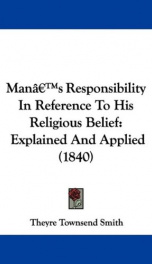mans responsibility in reference to his religious belief

Purchase of this book includes free trial access to www.million-books.com where you can read more than a million books for free. This is an OCR edition with typos. Excerpt from book: LECTURE III. THE RECOGNITION OF THIS DOCTRINE ESSENTIAL TO THE ACQUIREMENT OF RELIGIOUS KNOWLEDGE. John vii. 16, 17. JESUS ANSWERED THEM AND SAID, MY DOCTRINE IS NOT MINE, BUT HIS THAT SENT ME. IF ANY MAN WILL DO HIS WILL, HE SHALL KNOW OF THE DOCTRINE WHETHER IT BE OF GOD, OB WHETHER I SPEAK OF MYSELF. In maintaining the reasonableness of the doctrine conveyed in Christianity, that we are accountable to God in reference to our belief as well as our conduct, we have premised, not merely the fact itself of our accountableness to him, or the supreme duty of obeying him, but also, that whatever is in reality morally right is conformable to the will of God:we have said in reality morally right, because the question as to what extent, or under what limitations, that which mankind believe to be morally right is likely to be so, may be found to be seriously involved in the discussion of that doctrine: indeed, we apprehend, this will be sufficiently evident inthe farther prosecution of the subject. Looking then from these premises, we have seen that the desires and inclinations of mankind take extensive effect on the determinations of the judgment; both as they impel us to voluntary acts, bearing, more or less directly, on the attainment of knowledge, or belief of the truth, and as they exert an immediate influence on the operations of the intellect in general, by their own nature, or in the very mode of their working in the mind as principles of conduct. It follows, then, that our responsibility to the Divine Being with regard to the exercise of our understanding, and, consequently, the nature of our belief concerning him, is commended to our rational acknowledgment by the two following inferences, as direct and undeniable as they are fitted, by their importance, to arrest t...
Users who have this book
Users who want this book
What readers are saying
What do you think? Write your own comment on this book!
write a commentif you like mans responsibility in reference to his religious belief try:
Other books by this author
Do you want to exchange books? It’s EASY!
Get registered and find other users who want to give their favourite books to good hands!


